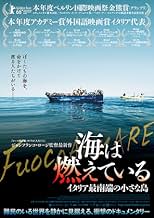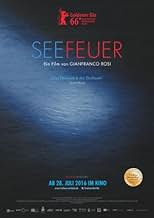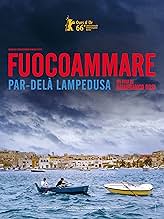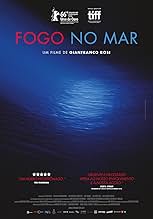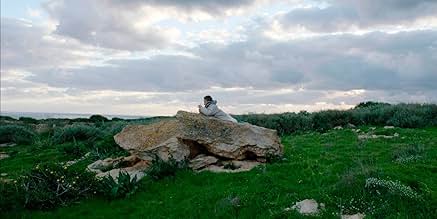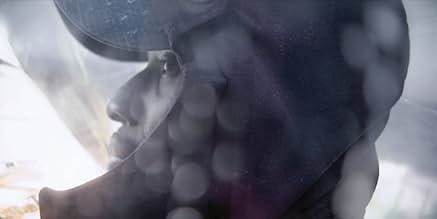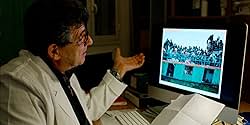Un retrato de la vida en la isla italiana de Lampedusa, uno de los frentes de la crisis migratoria europea.Un retrato de la vida en la isla italiana de Lampedusa, uno de los frentes de la crisis migratoria europea.Un retrato de la vida en la isla italiana de Lampedusa, uno de los frentes de la crisis migratoria europea.
- Dirección
- Guionistas
- Elenco
- Nominado a 1 premio Óscar
- 16 premios ganados y 28 nominaciones en total
- Dirección
- Guionistas
- Todo el elenco y el equipo
- Producción, taquilla y más en IMDbPro
Opiniones destacadas
We see the Italian navy rescuing migrants from their sinking overcrowded boats and dinghies; many of them are in a desperate condition after days at sea. We get glimpses of the 'internment camp'where they wait to be processed and sent on to their uncertain future in a Europe which is increasingly unwelcoming.
Alternating with the refugee crisis, the film's main focus is Samuele, a 12-year-old Lampedusan who lives with his fisherman father and grandmother. The family play themselves in the style of a Pasolini movie (minus the sex and the blasphemy). We watch Samuele slurping spaghetti, struggling with homework, playing with a slingshot. They seem to have a very limited awareness of the migrant situation, although that is perhaps only the director's way of pointing up the contrast between the ordinariness of their lives and the appalling tragedy taking place in the waters around their island.
This heart-wrenching film offers no solution to the crisis. How could it? There clearly isn't one.
So the common thing in the film is the Sea that divides the two continents, Europe and Africa. This film sets around that region about the people who depended on it for the living, growing up and looking for the fresh life start. But the majority of those who saw it recognise only the refugees who cross the sea. That's wrong to label this film is about the refugees. Around 20-25 per cent of the film concentrated on that issue. Only about their struggle on their journey to the other side, but it reveals nothing on its root cause. If you ask me, I would say only one religion making all this mess in the middle-east, otherwise you won't see the western army in that region.
Some of the clips, the real ones are really disturbing. I won't blame those people who took such risk to get the other side of the sea. Believe me, I'm not a nationalist, so I won't believe in borders and regions that divided over language and ethnicity base. But I do mind the religious. If that was eradicated from the earth's surface, particularly one that's causing all the trouble immediately, we can co-exist peacefully. That's the major issue here, but we're after temporary solution. The film does not say all this, but you will get the clear picture.
"The ships fired rockets and at sea. It was like there was fire at sea."
For me this was an average film. I have seen the much better documentaries than this on various issues of the world. The filmmakers don't want to take sides, so they only revealed the truth by just following and making videos of life in and around the Mediterranean Sea. Like I meantioned earlier, some of the angles do not make any sense or difficult to understand its purpose. I don't know the others, but I have got plenty of questions about the film to ask the filmmakers. If you are like me, welcome aboard.
It was the Italian entry for the 2017 Oscars and it did not make, but found a slot in the list of Best Documentary Feature. This is the first out of five from that category I have seen, so I don't know whether it wins the award or not, but as per the prediction made by film fanatics and critics, this is the frontrunner.
Whatever the result would be, I'm not recommending it particularly the common people. Because the film fails to narrate the story which is very essential from the average peoples' perspective to get the message clear and loud. All one can get with this is only the outline on the very important issue at the moment. Remember how the David Attenborough's narration made to reach all the corners of the earth. Confusing over the purpose of the documentary, possibly misleading. Its like watching a news channel on the mute mode. Otherwise, this should have been one of the best of its kind.
5/10
The style of this film is cinema-vérité, simply observing the various subjects in a very quiet way. Most of the attention is given to the island residents, particularly a twelve-year old boy. In the beginning, there are occasional feelings of boredom but once getting used to the meditative style, the movie is quite rewarding.
At first, one might wonder why there is less attention on the migrants but this eventually becomes understandable. If they had been the main subject, it is possible the viewer would feel overwhelmed and numb by the end. The smaller number of scenes end up having a greater impact. While not always horrific, the viewer sees up close the people behind the headlines - the migrants as well as the rescuers. Emotions run high before the viewer is bought back to daily routine life on the island which seems very distant from the lives of the migrants.
Director Gianfranco Rosi is very wise in avoiding any methods to heighten the real-life drama. The approach as a simple witness works perfectly especially in some highlighted scenes: the despair of a local doctor who is distressed by the plight of so many; a Nigerian refugee recounting the plight of his former country and finding more trouble in Libya as he and others traveled north; and of course, the indescribable feelings of seeing a large boat with hundreds of people cramped in it.
¿Sabías que…?
- TriviaDirector Gianfranco Rosi did his own cinematography again, but used for the first time an ARRI Amira camera, which he said allowed him to shoot in dark environments: "Sometimes it looked like we had an incredible amount of light. Technology helped me a lot on this film. Being able to work with this tiny camera by myself was an incredible tool." [2016]
- Citas
Nigerian Refugee: This is my testimony... We could no longer stay in Nigeria. Many were dying. Most were bombed... We flee from Nigeria. We ran to the desert. We went Sahara Desert and many died... Raping and killing many people, and we could not stay. We flee to Libya. And Libya was a city of ISIS. And Libya was a place not to stay... On the journey on the sea, 200 passengers died. They got lost to the sea. A boat was carrying 90 passengers. Only 30 were rescued, and the rest died. Today we are alive...
- ConexionesFeatured in Subject (2022)
Selecciones populares
- How long is Fire at Sea?Con tecnología de Alexa
Detalles
- Fecha de lanzamiento
- Países de origen
- Sitios oficiales
- Idiomas
- También se conoce como
- Fire at Sea
- Locaciones de filmación
- Productoras
- Ver más créditos de la compañía en IMDbPro
Taquilla
- Total en EE. UU. y Canadá
- USD 120,933
- Total a nivel mundial
- USD 1,178,377
- Tiempo de ejecución1 hora 54 minutos
- Color
- Mezcla de sonido
- Relación de aspecto
- 1.85 : 1
Contribuir a esta página


![Ver Trailer [OV]](https://m.media-amazon.com/images/M/MV5BNmQ3ZjU0NzktZWFmNi00YzMxLTg1N2UtMGM3ZTgwMDU3OWJlXkEyXkFqcGdeQXRodW1ibmFpbC1pbml0aWFsaXplcg@@._V1_QL75_UX500_CR0)


